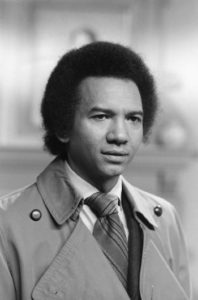
Al Freeman Jr.
*Al Freeman Jr. was born on this date in 1934. He was a Black actor, writer, and college (drama) professor.
Albert Cornelius Freeman, Jr., was born in San Antonio, TX, the son of Albert Cornelius (a jazz pianist) and Lottie Brisette (Coleman) Freeman. His parents divorced when he was nine, and he rarely saw his jazz pianist father, who had moved to Columbus, Ohio. Freeman began studying acting at Los Angeles City College in 1951 but took a hiatus to serve in the U.S. Air Force.
After three years of military service, he returned to Los Angeles and enrolled in "every speech, broadcasting, and drama class I could take," according to the actor in Ebony magazine. He trained for the stage with Jeff Corey, Harold Clifton, and Frank Silvera.
While still a student, he made his stage debut in a 1954 Ebony Showcase Theatre production of Detective Story. Freeman moved to New York City in 1959 and won a role in the 1960 Broadway play The Long Dream, based on a novel by Richard Wright. The show closed after only five performances, but the young actor soon found other work close at hand. On January 8, 1960, Freeman married Sevara E. Clemon; they later divorced. Most of Freeman's roles during the period "were as an angry young militant."
For Freeman, acting in such roles demonstrated his commitment to the civil rights struggle and the values he believed in. One of Freeman's favorite roles was that of Richard Henry in the James Baldwin play Blues for Mister Charlie, a work loosely based on the circumstances surrounding the 1955 murder of Emmitt Till. He also took important parts in two dramas by Amiri Baraka, The Slave and Dutchman.
In the late 1960s and early 1970s, Freeman juggled stage and film credits, with roles in movies such as The Detective, The Lost Man, My Sweet Charlie, A Fable, and Finian's Rainbow. In 1972, he accepted a small but continuing role as a police detective on the daytime drama One Life To Live. He stayed on that television show for 17 years, inhabiting a character whose importance to the plots increased over time.
Freeman was awarded an Emmy Award in 1979 for his work as stoic police captain Ed Hall. That same year, he was chosen to portray Malcolm X in the mini-series Roots: The Next Generations. He earned a second Emmy nomination for that performance. Freeman left One Life to Live in 1988 for a teaching position at Howard University.
By 1990, he had semi-retired from performing, preferring primarily to teach and spend time on his 40-foot sailboat moored in the Potomac basin. He was lured back into film, however, when he received a telephone call from director Spike Lee, who was casting for a new movie about Malcolm X. This time, Freeman was not considered for the title role but rather for the supporting character of Elijah Muhammad. Freeman auditioned for the role and was thrilled when he won it. "I really didn't do the picture because of the money," he told Ebony Magazine. "Certainly, Spike didn't pay me that much. But that wasn't the point. The point was that it had to do with my life. It seemed to be coming around full circle." He added: "I had gotten old enough to play Elijah, and that seemed to close the loop somehow." The film Malcolm X was a critical and commercial success, and Freeman found himself back in the limelight. Perhaps the most moving reaction to Freeman's portrayal of Elijah Muhammad came from one of the granddaughters of the religious leader himself who, after seeing the film, sent him a bouquet.
Freeman appeared in the 1994 made-for-TV movie Assault at West Point and also played Poppa's role in the film Once Upon a Time ... When We Were Colored, which debuted in 1995. After that, Freeman was content to take an occasional foray into acting while devoting most of his time to his students at Howard. His Awards were an Emmy Award nomination in 1970 for My Sweet Charlie; Emmy Award, best actor in a daytime drama in 1979 for One Life To Live; Russwurm Award; Golden Gate Award. His writings consisted of A Fable (screenplay), MFR, 1971. Countdown at Kusini, a screenplay with Ossie Davis and others, Columbia, 1976. Al Freeman Jr. died on August 9, 2012.
Academy of Motion Picture Arts and Sciences
Academy Foundation
8949 Wilshire Boulevard
Beverly Hills, California 90211
Phone: 310-247-3000